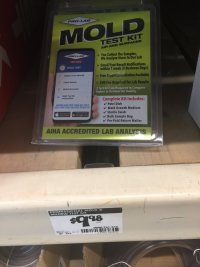I hear you and appreciate the feedback. So if I understand you correctly enforcement would go something like this: "I'm sorry I can't post an unsafe to occupy notice because I'm not trained to identify mold but if you can provide evidence of toxic mold we will post an unsafe notice." Tennant then hires a third party to sample the mold, get it identified, then present a report stating the the toxic was identified at said address. Once we validate the report then we post the notice and begin the enforcement process? That sounds much better for us as a city entity, though it sounds like it limits the ability of tenants to prove the mold is toxic unless they can afford to prove it. I agree that seems like the best way to go, but how long do the tenants have to live with toxic mold before we can step in?
The case I'm dealing with is a historic Victorian house that has been converted into an apartment complex. One tenant has been sick for almost a year and finally got a diagnosis of toxic mold exposure from a doctor. She feels that this report from her doctor should be enough for us to start an enforcement. I don't have any way to prove that the mold she's been exposed to came from the house she's living in. So on top of everything else she and her daughter are dealing with, pandemic, unemployment, and being sick, she now has to track down someone to identify this mold as coming from the house? I can't even find anyone in our area qualified, or willing, to do this for her. Isn't this exactly what we are supposed to be able to help with? Fire Safety, Life Safety, and Health Safety. That's exactly what a building department is tasked with enforcing to protect our citizens.
It seems to me if I can get some training that it would be pretty easy to take some samples and send them to a lab. If it's ID'd as toxic mold, post the unsafe notice. That doesn't seem to outrageous. But I would definitely like to hear other reasons why I should be cautious, what am I missing or not thinking about? Thanks again for the discus
I don’t think you want that. For 1000’s if reasons
Just add wording to an ordinance stating you can require business/ owner to hire third party inspector and they furnish you a copy of the report,
Maybe also add you can require the place to be vacated, till issue resolved.
I like the Idea of getting a city ordinance to require the property owner to provide the testing, I just feel like they could, and would, fight it and drag their feet. Seems simpler for us to do it ourselves.

